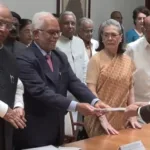FROM PAGES TO PIXELS
In the pristine valleys of Kashmir, where silence often echoes louder than noise, libraries once served as sanctuaries of thought, imagination, and learning. Students, scholars, and dreamers would gather beneath the warm glow of reading lamps, immersed in the rustle of turning pages. Today, that rustle is slowly fading, replaced by the ceaseless tapping and scrolling on smartphones.
We are living in an age where attention spans are shrinking and deep reading is giving way to digital skimming. The smartphone, once a tool of communication, has become an overpowering medium of distraction. Social media platforms and short video content dominate our screens, often offering instant gratification but rarely providing lasting knowledge or reflection. The tragedy is not just the decline of reading but the fading of a culture that once valued introspection, patience, and mindful engagement with ideas.
This is particularly evident among the younger generation in Kashmir. Our students, once encouraged to read books and explore libraries, are increasingly drawn to the glitter of digital media. Instagram reels and TikTok videos have replaced poetry anthologies and historical biographies. The physicality of a book, the texture of its pages, the smell of old paper, the handwritten notes in the margins, is being traded for mindless swipes through curated feeds.Libraries across the valley, though still standing, are underutilized. Many are quiet not because of reading, but because of absence. Shelves gather dust, and books that once sparked revolutions of thought now sit unopened.Ironically, this is happening at a time when knowledge has never been more accessible. We have libraries with thousands of books, access to digital archives, e-resources, and educational platforms yet the will to read is vanishing.This trend is not just a cultural concern but an educational emergency. Reading is not a passive activity; it cultivates empathy, critical thinking, and depth of understanding. It helps us engage with different perspectives, enriches vocabulary, and shapes our identity as informed individuals. When reading declines, so does the ability to think deeply, to question, and to imagine a better future.
Scrolling, on the other hand, encourages superficial engagement. It thrives on dopamine-driven impulses, creating an endless loop of consumption without contemplation. Our minds become accustomed to rapid content, making it harder to sit with a complex idea or absorb a long paragraph. This shift is evident in classrooms, where students often struggle with reading comprehension and sustained focus.But all hope is not lost. Across Kashmir, a quiet movement is emerging one that seeks to revive the culture of reading. Community libraries, book cafes, reading clubs, and literary festivals are being organized by young enthusiasts.
In homes, some parents are returning to the practice of reading bedtime stories. Schools are beginning to integrate book discussions and storytelling sessions. Social media itself, ironically, is being used to promote reading, with Kashmiri youth posting book reviews and poetry recitations on Instagram and YouTube.However, this revival needs collective willpower. We need to reimagine libraries not just as physical spaces, but as cultural hubs. Public investment in libraries, both in infrastructure and staffing, is essential. School libraries must be functional and accessible, with trained librarians guiding students toward meaningful literature.
Digital reading platforms can also be harnessed to complement traditional reading, especially in remote areas. We must also advocate for screen-time awareness, and encourage youth to take regular “digital detoxes” to reconnect with books and nature.Most importantly, the change must begin at home. Children who see parents reading are more likely to develop the habit themselves. Let us replace one hour of nightly scrolling with an hour of shared reading. Let our homes echo once again with the sound of stories, ideas, and curiosity.In the words of Jorge Luis Borges, “I have always imagined that Paradise will be a kind of library.” Let us not lose this paradise to the void of infinite scrolling.
Books are not just objects, they are companions, mentors, and mirrors. As Kashmir stands at the crossroads of tradition and modernity, we must choose to carry the wisdom of pages with us. For in a world full of noise, reading remains one of the few acts of silent rebellion.(Author is a Library Futurist, writer and passionate about promoting a culture of reading and knowledge-sharing, he has written several books on lib and information sciences. Email: [email protected])








